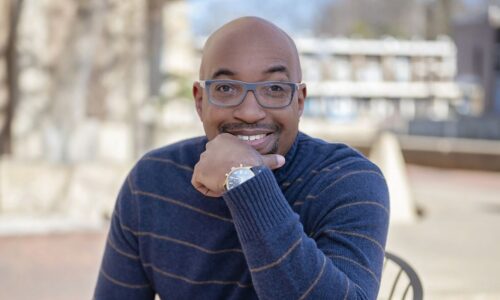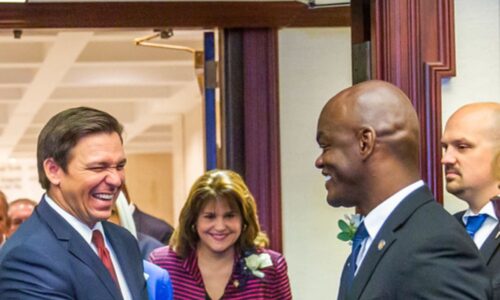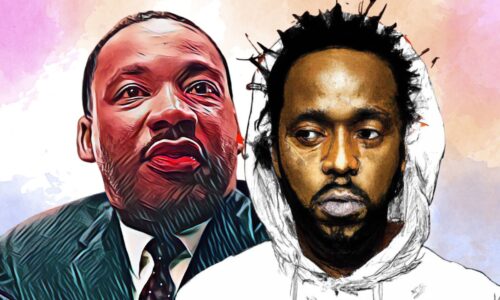[O]f all the people who have a national holiday in their honor Martin Luther King, Jr. is surely among the most deserving. Not just because of all that he achieved in his lifetime but because his legacy is still, and will forever be, significant to the American public.
If not for his tragic and untimely assassination, he would have been 86-years-old on Thursday. His messages of non-violence still stand as an unwavering force of moral righteousness, striving for brotherhood and community over the disruptive forces of disunity and violence. He not only refused, but denounced the temptation to answer hate with hate. Instead, he responded to oppression with a message of peace, equality and reason.
“In the wake of today’s violent events and societal unrest, Dr. King’s legacy of non-violent protest and peaceful resistance has made a resurgence,” Alicestyne Turley, Director of the Carter G. Woodson Center for Interracial Education, explained to CollegeHipHop.com.
“No matter how uncomfortable chanting protestors, ‘die-ins,’ and traffic slowdowns may make us feel in the aftermath of Ferguson and Eric Garner, no one can deny, without bullets and or bloodshed, in today’s America, all citizens possess the right to have their voices heard,” Turley said.
No doubt he would have been immensely proud of the people who took to the streets peacefully, to protest against injustice. Equally, it is hard to imagine that Dr, King would not have been sorrowfully disappointed by the continuing social and economic inequality that pervades American society.
It is this commitment to non-violence that defines Martin Luther King and his legacy, both of which will be honored throughout the nation on Monday (January 19th), four days after his birthday. Sadly, from the time President Reagan signed MLK Day into law (1983) until recently, there was a fight to have all 50 states even recognize Dr. King’s birthday as a national holiday.
| https://www.youtube.com/watch?v=zrFOb_f7ubw |
| Public Enemy’s video for “By The Time I Get To Arizona” caused controversy, to say the least. The group took issue with Arizona’s handling of MLK day in the early 1990’s. The video was banned. |
Arizona wouldn’t budge until 1992. New Hampshire and South Carolina held out until 1999 and 2000 respectively, before officially acknowledging Martin Luther King, Jr. Day. Hip-Hop group Public Enemy took on the issue, as well as the state with their classic song “By The Time I Get To Arizona” from the album Apocalypse ’91…The Enemy Strikes Black.
Public Enemy’s video for the single caused a major uproar and was banned from television, for featuring a look-a-like of the racist Governor, Evan Mecham, being assassinated.
“We did the Arizona video knowing that it was probably going to be played one time,” Chuck D. said in the book Don’t Rhyme for the Sake of Riddlin’: The Authorized Story of Public Enemy. “It really tested the waters. But the minute they all tried to ask me some questions, I was already in Hamburg, Germany.”
Chuck D. pointed out that while his video may have been questionable, the fact that these states refused to acknowledge Dr. King’s holiday was even more offensive.
“I took it upon myself to become Steven Spielberg and come up with my own apocalyptic ending of taking out crooked politicians and it was supposed to be that they were crooked politicians,” Chuck D. argued. “But you know, at that particular time any of that coming out of the area of rap was bound to attract a hysterical response.”
In 2015, the nation might be united in its commitment to celebrating Martin Luther King Jr., but there is considerable work to be done, in order to make his “dream” a reality. Last year was certainly one which could have benefitted from the commanding presence of Dr. King.
“My father once said ‘Non-violence is a powerful and just weapon that cuts without wounding and ennobles the man who wields it, it’s a sword that heals’. Healing is what we need after Michael Brown and Eric Garner,” said Martin Luther King Jr. III.
 |
| “The First Vote” a wooden engraving by A.R. Waud, circa 1867. |
His father did not just say these words, he proved them. Due to his contribution to the civil rights movement in the 1960’s Congress passed the Voting Rights Act of 1965.
The bill was, and arguably still is the most positive step forward for racial equality in America since the 15th Amendment was ratified almost one hundred years prior.
Unfortunately, there are powers that continue to attempt to suppress voting rights. Just last week, a top House Republican said it wasn’t important to restore fundamental portions of the Voting Rights Act that helps prevent discrimination.
“The protections of the Voting Rights Act must be restored. The weakening of VRA left millions of Americans vulnerable to discriminatory state laws,” said Congressional Black Caucus (CBC) Chair G. K. Butterfield.
Butterfield and ten other members of the CBC are currently in Ferguson, Missouri, to participate in activities to honor Dr. King’s legacy, as well as encourage unity and civic action through voting.
“To do nothing sends a terrible message, not only to minorities, but to anyone who believes the right to vote is essential to our democracy and way of life,” Chairman Butterfield warned.
Another frequently forgotten aspect of Martin Luther King’s philosophy was inclusion. The Baptist minister made it a point to include all ethnicities as comrades in the fight against racial inequality.
He warmly welcomed people of different races who desired to help his cause and spoke passionately, but reasonably against those who stood against him. It is a lesson that we desperately need to remember. Police brutality is a problem for the African-American community. However, it is also an issue for all Americans who are invested in the cause of equality.
Sadly, due to the polarizing nature of much of the media coverage, the movement for greater social justice is being divided. Now, more than ever, we must remember Martin Luther King Jr.’s belief in brotherhood and friendship.
[F]ortunately, there are still many people who remember and acknowledge the legacy of Martin Luther King, Jr. The success and critical acclaim, which has met the movie “Selma” is a strong indication that MLK’s spirit and message still resonate with the vast majority of the American public.
The film details MLK’s involvement in 1965’s peaceful protest marches between Selma and Montgomery, in Alabama. The march was orchestrated to highlight the continued difficulties faced by African-Americans trying to vote, particularly in the southern states.
The release of “Selma” is not the only thing planned in honor of Martin Luther King Day.
At the King Center in Atlanta, Martin Luther King Day was the focal point for a week of celebration, which involved educational lectures, youth programs, and community service projects.
“His teachings are still relevant forty-seven years after his assassination because they compel mankind to confront injustice wherever it exists,” said Dr. King’s daughter Dr. Bernice King,
President Bill Clinton received the non-profit’s “Salute to Greatness Award” for his charitable work around the world via The Clinton Foundation. Kaiser Permanente CEO Bernard Tyson was recognized for his role in diversifying the company and Dr. King’s sister, Dr. Christine King Farris, received a “Legacy of Service” award for her activism.
 |
| Rabbi Max Nussbaum and Martin Luther King Jr. In Los Angeles, Temple Israel of Hollywood, 1965. |
In Los Angeles, over 130 artists, musicians, clergy, choir members and influential community members gathered at Temple Israel of Hollywood, to hear a keynote address by Tavis Smiley, amongst other celebratory events. The day celebrated the 50th anniversary of Dr. King’s sermon at the Temple in 1965.
On Dr. King’s official holiday, his supporters held a day of activism during the 3rd Annual MLK Day Clothes Drive and Community Breakfast.
The year of 2014 certainly highlighted that we are not yet living in the America which Martin Luther King, Jr. and countless other members of the civil rights movement envisioned.
However, this does not suggest that we should regress back into the violence of the past.
In terms of both racial equality and the way in which we protest, Martin Luther King helped move America forward.
It does his legacy a disservice to allow social injustices to continue without protest, but no more so than protesting in a violent and destructive manner.
“In extremely difficult situations, through dog bites, hoses, and homes being bombed, Dr. Martin Luther King, maintained his posture of nonviolent protest,” activist/author Dr. Julianne Malveaux told CollegeHipHop.com.
Dr. Malveaux, former President of Bennett College in Greensboro, North Carolina, encouraged young people to continue Dr. King’s non-violent spirit of resistance.
“In doing so, he maintained the integrity of the movement and deflected some of the criticism of his work. In the spirit of Dr. King, we must continue to protest nonviolently. I am so proud of our young people for their work and for their leadership, and I ask that they continue to protest in the spirit of Dr. King,” said Malveaux. “The celebrations throughout the country show that most Americans have not forgotten MLK or his beliefs. Now we are faced with the far more complex task of putting that philosophy into action in our everyday lives.”




